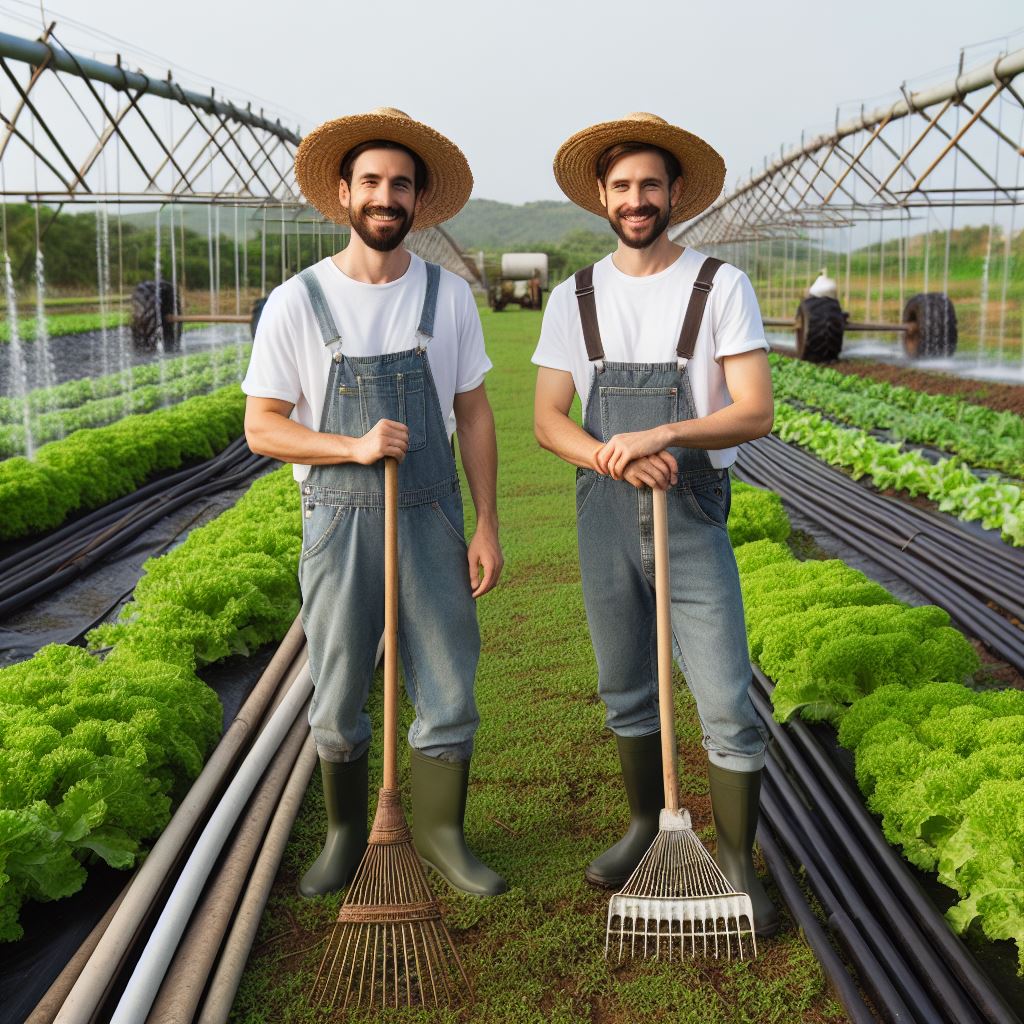Introduction
Organic farming is a method of agriculture that relies on natural processes and avoids synthetic chemicals.
Staying informed about organic farming trends is crucial for farmers to remain competitive and meet consumer demands.
The demand for organic products continues to rise as consumers become more health-conscious and environmentally aware.
Advancements in technology are transforming organic farming by increasing efficiency and productivity.
Adopting sustainable farming practices, such as crop rotation and soil conservation, is vital for the long-term success of organic farming.
Regenerative agriculture goes beyond organic farming by actively restoring soil health and biodiversity.
Stricter certification and labeling standards ensure transparency and maintain consumer trust in organic products.
Creative marketing approaches, like direct-to-consumer sales and online platforms, open new avenues for organic farmers to reach consumers.
Organic farming still faces challenges, including pests and weeds, but solutions like integrated pest management and cover cropping are being developed.
The future of organic farming looks promising, with increased research, support, and investment in sustainable agricultural practices.
In short, staying informed about organic farming trends is vital for farmers to adapt, innovate, and thrive in the evolving agricultural landscape.
By embracing change and exploring new opportunities, organic farming can continue to grow and contribute to a sustainable food system.
Current Trends in Organic Farming
Increase in consumer demand for organic produce
- Growing consumer awareness and concerns about the negative impacts of conventional farming practices.
- Health-conscious individuals seeking pesticide-free and chemical-free food options.
- Demand for organic products extending beyond fruits and vegetables to include dairy, meat, and processed foods.
- The rise of farmers’ markets and organic food stores catering to consumer preferences.
Transition of large-scale conventional farms to organic practices
- Conventional farmers recognizing the potential profitability and environmental benefits of organic farming.
- Implementation of organic practices as a way to diversify income and reduce reliance on external inputs.
- Conversion of land to organic agriculture through the use of natural fertilizers, crop rotation, and integrated pest management.
- Collaboration with organic farmers and experts to acquire knowledge and skills for a successful transition.
Emphasis on sustainable and regenerative farming techniques
- Focus on building healthy soils through increased organic matter content and soil biodiversity.
- Use of cover crops and green manures to improve soil fertility and reduce erosion.
- Integration of livestock and crop farming systems to enhance nutrient cycling and minimize waste.
- Adoption of agroforestry practices to promote biodiversity, enhance ecosystem services, and mitigate climate change.
Establishment of organic farming cooperatives
- Formation of cooperative groups to pool resources, share knowledge, and collectively market organic products.
- Collaborative efforts in purchasing inputs, equipment, and infrastructure to achieve economies of scale.
- Sharing of best practices and experiences among cooperative members to foster continuous improvement.
- Influence in policy advocacy and lobbying for favorable regulations and support for organic farming sector.
In fact, the organic farming industry is experiencing significant trends that highlight the growing consumer demand for organic produce, the transition of conventional farms towards organic practices, the emphasis on sustainable and regenerative farming techniques, and the establishment of organic farming cooperatives.
These trends reflect the shift towards a more environmentally conscious and health-oriented food system, providing opportunities for farmers and consumers alike to contribute to a sustainable future.
Read: Pollinators: Heroes of Organic Farming
Transform Your Agribusiness
Unlock your farm's potential with expert advice tailored to your needs. Get actionable steps that drive real results.
Get StartedTechnological Advancements in Organic Farming
Use of drones for monitoring and precision farming
The use of drones in organic farming has revolutionized the way farmers monitor and manage their crops.
Drones equipped with high-resolution cameras and sensors can capture detailed images and collect data, allowing farmers to detect problems such as nutrient deficiencies or pest infestations.
These drones can also be used for precision farming, where they can precisely apply fertilizers, pesticides, or irrigation to specific areas of the field.
This not only reduces the amount of chemicals used but also minimizes potential damage to the environment.
Adoption of smart farming techniques
Smart farming involves the integration of technology, such as sensors and IoT devices, to optimize agricultural practices.
These devices can monitor soil moisture, temperature, and other environmental factors in real-time, providing farmers with valuable insights into crop health and irrigation needs.
Through smart farming, farmers can automate processes such as irrigation, fertilizer application, and pest control, improving efficiency and reducing labor costs.
The use of smart sensors can also help farmers detect early signs of plant diseases, allowing for prompt intervention and minimizing yield losses.
Integration of artificial intelligence and machine learning in farming practices
Artificial Intelligence (AI) and machine learning have the potential to revolutionize organic farming by analyzing large volumes of data and providing intelligent insights for decision making.
Machine learning algorithms can process historical data on weather patterns, soil composition, and crop yields to predict optimal planting times and nutrient requirements.
AI-powered systems can also identify patterns and anomalies in crop health, enabling early detection of diseases or pest outbreaks.
By constantly learning and adapting, these systems become more accurate over time, helping farmers make informed decisions and improve overall crop productivity.
Development of organic farming apps and software
With the rise of smartphones and tablets, there has been an increase in the development of organic farming apps and software.
These digital tools provide farmers with access to a wide range of information and resources, right at their fingertips.
Organic farming apps can offer features such as crop planning, pest and disease identification, weather forecasting, market prices, and even connect farmers with potential buyers or suppliers.
This technology streamlines farm management tasks, enhances productivity, and facilitates knowledge sharing within the organic farming community.
In essence, technological advancements are paving the way for a more efficient and sustainable future in organic farming.
The use of drones, smart farming techniques, artificial intelligence, and software applications are enabling farmers to optimize their practices, reduce environmental impact, and increase crop yields.
As technology continues to evolve, organic farming will continue to benefit from these innovations, ensuring a healthier and more sustainable food system for future generations.
Read: Local Markets: The Impact of Organic Produce

Climate Change and Organic Farming
Impact of climate change on organic farming
- Rising temperatures, extreme weather events, and changing precipitation patterns negatively affect organic farming.
- Organic farmers face challenges such as droughts, floods, pests, and disease outbreaks.
- Unpredictable weather patterns make it difficult to plan and maintain a stable organic farming system.
- Loss of arable land due to soil erosion and desertification poses a threat to organic farming practices.
Implementation of climate-smart practices
- Organic farmers can adopt climate-smart practices to mitigate the effects of climate change.
- These practices include water conservation techniques, soil enrichment, and improved crop rotations.
- Efficient irrigation methods, such as drip irrigation, can minimize water usage and maximize crop productivity.
- Cover cropping and mulching help to improve soil fertility, reduce erosion, and conserve moisture.
Adoption of agroecology to mitigate climate change effects
- The adoption of agroecology principles can play a crucial role in building climate resilience in organic farming.
- Agroecology promotes biodiversity, soil health, and ecological balance, which are all essential for addressing climate change challenges.
- By embracing agroecological approaches, organic farmers can enhance ecosystem services and reduce carbon emissions.
- Agroforestry, agroforestry, and permaculture are examples of agroecological practices that integrate tree cultivation with organic farming.
Importance of crop diversity and soil health in climate resilience
- Crop diversity is vital in building resilience against climate change impacts.
- Planting a variety of crops in organic farms helps mitigate the risk of crop failure due to unpredictable weather conditions.
- Healthy soils play a crucial role in organic farming’s ability to adapt to climate change.
- Organic farmers prioritize building and maintaining healthy soils through practices like composting and avoiding synthetic fertilizers.
Overall, climate change poses significant challenges to organic farming, but proactive measures can be taken.
By implementing climate-smart practices, adopting agroecological approaches, and promoting crop diversity and soil health,
organic farmers can enhance their resilience to climate change and contribute to a sustainable agricultural system.
Read: Organic Certification: Process and Benefits
Showcase Your Farming Business
Publish your professional farming services profile on our blog for a one-time fee of $200 and reach a dedicated audience of farmers and agribusiness owners.
Publish Your ProfileChallenges and Opportunities in Organic Farming
Struggles with Organic Certification Process
- Organic farmers face challenges in the complex and expensive certification process.
- The stringent standards and paperwork for certification can be overwhelming for small-scale farmers.
- Lack of clarity in organic certification guidelines can lead to confusion and frustration.
- High costs associated with organic certification make it difficult for small farmers to compete.
Competition with Industrial Agriculture
- Organic farmers often struggle to compete with the efficiency and scale of industrial agriculture.
- Large-scale industrial farms have better access to resources and distribution networks.
- Price competition from conventional agriculture makes it challenging for organic farmers to maintain profitability.
- Market dominance of industrial agriculture limits the market share available for organic products.
Potential for Organic Farming in Urban Areas
- Urban areas present an untapped potential for organic farming.
- Rooftop gardens and vertical farming techniques allow for organic production in limited spaces.
- Local demand for fresh and organic produce in urban areas creates market opportunities for organic farmers.
- Urban agriculture can mitigate food deserts and secure food supply chains in cities.
Growth of Organic Farming in Developing Countries
- Developing countries show increasing interest and growth in organic farming.
- Organic farming can provide sustainable solutions for food security and poverty reduction.
- Indigenous farming practices in developing countries align with organic principles.
- Export opportunities for organic products from developing countries can boost their economies.
In a nutshell, organic farming faces both challenges and opportunities in various aspects.
The struggles with the organic certification process, competition with industrial agriculture, and the need to tap into urban areas present obstacles for organic farmers.
However, the potential for organic farming in urban areas and the growth of organic farming in developing countries offer opportunities for expansion.
Despite the challenges, organic farming continues to gain traction as consumers become more conscious of their food choices and the importance of sustainable farming practices.
Read: Composting: Organic Waste to Farm Gold
Conclusion
Organic farming has gained significant momentum in recent years, with consumers showing a growing preference for organic products.
Farmers have embraced sustainable practices, such as crop rotation, composting, and biological pest control.
The future of organic farming looks promising, with several potential developments on the horizon.
Advancements in technology may enhance productivity and efficiency, such as precision agriculture and robotic farming.
In addition, vertical farming and hydroponics could revolutionize organic crop cultivation, allowing year-round production and resource conservation.
As the organic farming industry evolves, it is imperative for farmers to embrace continuous learning and adaptation.
Staying updated on the latest research and innovations will enable organic farmers to optimize their techniques, improve yields, and mitigate potential challenges.
Collaboration between farmers, researchers, and policymakers is crucial for fostering sustainable growth in the organic farming sector.
Organic farming has witnessed significant growth, with current trends emphasizing sustainable practices and consumer demand.
The future of the industry holds potential for technological advancements and innovative cultivation methods.
However, to thrive in this dynamic landscape, organic farmers must prioritize continuous learning and adaptation to ensure long-term success.
By embracing change and nurturing a culture of knowledge sharing, the organic farming industry can continue to flourish.




